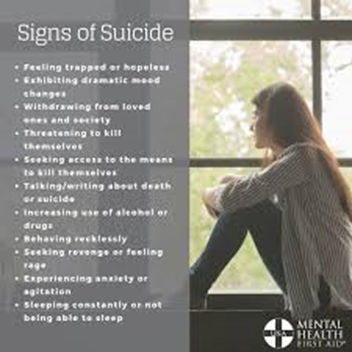Suicide:
What To Do When Someone Is Suicidal
When someone you know
appears suicidal, you might not know what to do. Learn warning signs, what
questions to ask and how to get help.
When people say they're
thinking about suicide, or say things that sound like they're considering
suicide, it can be very upsetting. You may not be sure what to do to help,
whether you should take talk of suicide seriously, or if your intervention
might make the situation worse. Taking action is always the best choice. Here's
what to do.
Start by asking
questions
The first step is to find
out whether the person is in danger of acting on suicidal feelings. Be
sensitive, but ask direct questions, such as:
How are you coping with
what's been happening in your life?
Do you ever feel like just
giving up?
Are you thinking about
dying?
Are you thinking about
hurting yourself?
Are you thinking about
suicide?
Have you ever thought about
suicide before, or tried to harm yourself before?
Have you thought about how
or when you'd do it?
Do you have access to
weapons or things that can be used as weapons to harm yourself?
Asking about suicidal
thoughts or feelings won't push someone into doing something self-destructive.
In fact, offering an opportunity to talk about feelings may reduce the risk of
acting on suicidal feelings.
Look for warning
signs
You can't always tell when a
loved one or friend is considering suicide. But here are some common signs:
Talking about suicide — for
example, making statements such as "I'm going to kill myself,"
"I wish I were dead" or "I wish I hadn't been born"
Getting the means to take
their own life, such as buying a gun or stockpiling pills
Withdrawing from social
contact and wanting to be left alone
Having mood swings, such as being
emotionally high one day and deeply discouraged the next
Being preoccupied with
death, dying or violence
Feeling trapped or hopeless
about a situation
Increasing use of alcohol or
drugs
Changing normal routine,
including eating or sleeping patterns
Doing risky or
self-destructive things, such as using drugs or driving recklessly
Giving away belongings or
getting affairs in order when there is no other logical explanation for doing
this
Saying goodbye to people as
if they won't be seen again
Developing personality
changes or being severely anxious or agitated, particularly when experiencing
some of the warning signs listed above
For immediate help
If someone has attempted
suicide:
Don't leave the person
alone.
Call 911 or your local
emergency number right away. Or, if you think you can do so safely, take the
person to the nearest hospital emergency room yourself.
Try to find out if the
person is under the influence of alcohol or drugs or may have taken an
overdose.
Tell a family member or friend
right away what's going on.
If a friend or loved one
talks or behaves in a way that makes you believe the person might attempt
suicide, don't try to handle the situation alone:
Get help from a trained
professional as quickly as possible. The person may need to be hospitalized
until the suicidal crisis has passed.
Encourage the person to call
a suicide hotline number.
In the U.S., anyone needing
help can call or text 988 to reach the 988 Suicide & Crisis Lifeline,
available 24 hours a day, seven days a week. Or use the Lifeline Chat. Services
are free and confidential.
U.S. veterans or service
members who are in crisis can call 988 and then press "1" for the
Veterans Crisis Line. Or text 838255. Or chat online.
The Suicide & Crisis
Lifeline in the U.S. has a Spanish language phone line at 1-888-628-9454
(toll-free).
Teen suicide
prevention
Teenagers: When someone you
know is suicidal
If you're a teenager who's
concerned that a friend or classmate may be considering suicide, take action.
Ask the person directly
about their feelings, even though it may be awkward. Listen to what the person
has to say and take it seriously. Just talking to someone who really cares can
make a big difference.
If you've talked to the
person and you're still concerned, share your concerns with a teacher, guidance
counselor, someone at church, someone at a local youth center or another
responsible adult.
It may be hard to tell
whether a friend or classmate is suicidal, and you may be afraid of taking
action and being wrong. If someone's behavior or talk makes you think the
person might be suicidal, that individual may be struggling with some major
issues, even if not considering suicide at the moment. You can help the person
get to the right resources.
Offer support
If a friend or loved one is
thinking about suicide, professional help is needed, even if suicide isn't an
immediate danger. Here's what you can do.
Encourage the person to seek
treatment. A suicidal or severely depressed person may not have the energy or
motivation to find help. If the person doesn't want to consult a doctor or
mental health provider, suggest finding help from a support group, crisis
center, faith community, teacher or other trusted person. You can offer support
and advice — but remember that it's not your job to substitute for a mental
health provider.
Offer to help the person
take steps to get assistance and support. For example, you can research
treatment options, make phone calls and review insurance benefit information,
or even offer to go with the person to an appointment.
Encourage the person to
communicate with you. Someone who's suicidal may be tempted to bottle up
feelings because the person feels ashamed, guilty or embarrassed. Be supportive
and understanding, and express your opinions without placing blame. Listen
attentively and avoid interrupting.
Be respectful and
acknowledge the person's feelings. Don't try to talk people out of their
feelings or express shock. Remember, even though someone who's suicidal isn't
thinking logically, the emotions are real. Not respecting how the person feels
can shut down communication.
Don't be patronizing or
judgmental. For example, don't tell someone, "Things could be worse"
or "You have everything to live for." Instead, ask questions such as,
"What's causing you to feel so bad?" "What would make you feel
better?" or "How can I help?"
Never promise to keep
someone's suicidal feelings a secret. Be understanding, but explain that you
may not be able to keep such a promise if you think the person's life is in
danger. At that point, you have to get help.
Offer reassurance that
things can get better. When someone is suicidal, it seems as if nothing will
make things better. Reassure the person that with appropriate treatment, other
ways to cope can be developed and the person can feel better about life again.
Encourage the person to
avoid alcohol and drug use. Using drugs or alcohol may seem to ease the painful
feelings, but ultimately it makes things worse — it can lead to reckless
behavior or feeling more depressed. If the person can't quit on their own,
offer to help find treatment.
Remove potentially dangerous
items from the person's home, if possible. If you can, make sure the person
doesn't have items around that could be used for suicide — such as knives,
razors, guns or drugs. If the person takes a medication that could be used for
overdose, encourage the person to have someone safeguard it and give it as
prescribed.
Take all signs of
suicidal behavior seriously
If someone says they're thinking
of suicide or behaves in a way that makes you think the person may be suicidal,
don't play it down or ignore the situation. Many people who kill themselves
have expressed the intention at some point. You may worry that you're
overreacting, but the safety of your friend or loved one is most important.
Don't worry about straining your relationship when someone's life is at stake.
You're not responsible for
preventing someone from taking their own life — but your intervention may help
the person see that other options are available to stay safe and get treatment.
Jan Ricks Jennings, MHA,
LFACHE
Senior Consultant
Senior Management
Resources, LLC
JanJenningsBlog.Blogspot.com
412.913.0536
724.733.0509 Cell
August 28, 2022




No comments:
Post a Comment